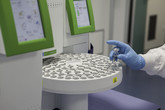Biosimilars/Research
|
Posted 09/10/2020
As cancer therapeutics constitutes a large proportion of the biologicals market, and patents have begun to expire, biosimilars have an important role in optimizing patient access and reducing costs in the oncology therapeutic area. Authors Ngo and Chen from the City of Hope National Medical Center, Los Angeles, USA, give an overview of the US Food and Drug Administration (FDA)-approved biosimilars in oncology and their impact on the healthcare system in the Annals of Pharmacotherapy [1]. A summary of the main findings from that article follows.























